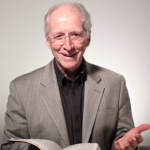 Article by Dr. Sinclair Ferguson (original source here)
Article by Dr. Sinclair Ferguson (original source here)
Sometimes people ask authors, “Which of your books is your favorite?” The first time the question is asked, the response is likely to be “I am not sure; I have never really thought about it.” But forced to think about it, my own standard response has become, “I am not sure what my favorite book is; but my favorite title is A Heart for God.” I am rarely asked, “Why?” but (in case you ask) the title simply expresses what I want to be: a Christian with a heart for God.
Perhaps that is in part a reflection of the fact that we sit on the shoulders of the giants of the past. Think of John Calvin’s seal and motto: a heart held out in the palm of a hand and the words “I offer my heart to you, Lord, readily and sincerely.” Or consider Charles Wesley’s hymn:
O for a heart to praise my God!
A heart from sin set free.
Some hymnbooks don’t include Wesley’s hymn, presumably in part because it is read as an expression of his doctrine of perfect love and entire sanctification. (He thought it possible to have his longing fulfilled in this world.) But the sentiment itself is surely biblical.
But behind the giants of church history stands the testimony of Scripture. The first and greatest commandment is to love the Lord our God with all our heart (Deut. 6:5). That is why, in replacing Saul as king, God “sought out a man after his own heart” (1 Sam. 13:14), for “the Lord looks on the heart” (16:7). It is a truism to say that, in terms of our response to the gospel, the heart of the matter is a matter of the heart. But truism or not, it is true.
What this looks like, how it is developed, in what ways it can be threatened, and how it expresses itself will be explored little by little in this new column. But at this stage, perhaps it will help us if we map out some preliminary matters in the form of a catechism on the heart:
Q.1. What is the heart?
A. The heart is the central core and drive of my life intellectually (it involves my mind), affectionately (it shapes my soul), and totally (it provides the energy for my living).
Q.2. Is my heart healthy?
A. No. By nature I have a diseased heart. From birth, my heart is deformed and antagonistic to God. The intentions of its thoughts are evil continually.
Q.3. Can my diseased heart be healed?
A. Yes. God, in His grace, can give me a new heart to love Him and to desire to serve Him.
Q.4. How does God do this?
A. God does this through the work of the Lord Jesus for me and the ministry of the Holy Spirit in me. He illumines my mind through the truth of the gospel, frees my enslaved will from its bondage to sin, cleanses my affections by His grace, and motivates me inwardly to live for Him by rewriting His law into my heart so that I begin to love what He loves. The Bible calls this being “born from above.”
Q.5. Does this mean I will never sin again?
A. No. I will continue to struggle with sin until I am glorified. God has given me a new heart, but for the moment He wants me to keep living in a fallen world. So day by day I face the pressures to sin that come from the world, the flesh, and the Devil. But God’s Word promises that over all these enemies I can be “more than a conqueror through him who loved us.”
Q.6. What four things does God counsel me to do so that my heart may be kept for Him?
A. First, I must guard my heart as if everything depended on it. This means that I should keep my heart like a sanctuary for the presence of the Lord Jesus and allow nothing and no one else to enter.
Second, I must keep my heart healthy by proper diet, growing strong on a regular diet of God’s Word — reading it for myself, meditating on its truth, but especially being fed on it in the preaching of the Word. I also will remember that my heart has eyes as well as ears. The Spirit shows me baptism as a sign that I bear God’s triune name, while the Lord’s Supper stimulates heart love for the Lord Jesus.
Third, I must take regular spiritual exercise, since my heart will be strengthened by worship when my whole being is given over to God in expressions of love for and trust in Him.
Fourth, I must give myself to prayer in which my heart holds on to the promises of God, rests in His will, and asks for His sustaining grace — and do this not only on my own but with others so that we may encourage one another to maintain a heart for God.
This — and much else — requires development, elaboration, and exposition. But it can be summed up in a single biblical sentence. Listen to your Father’s appeal: “My son, give Me your heart.”

